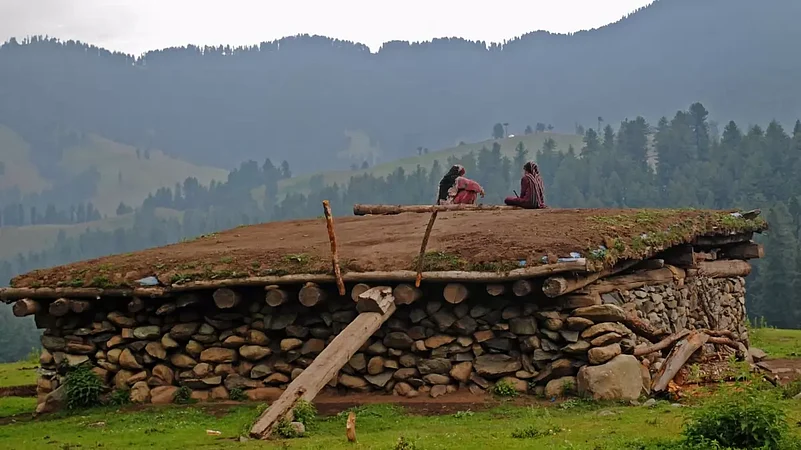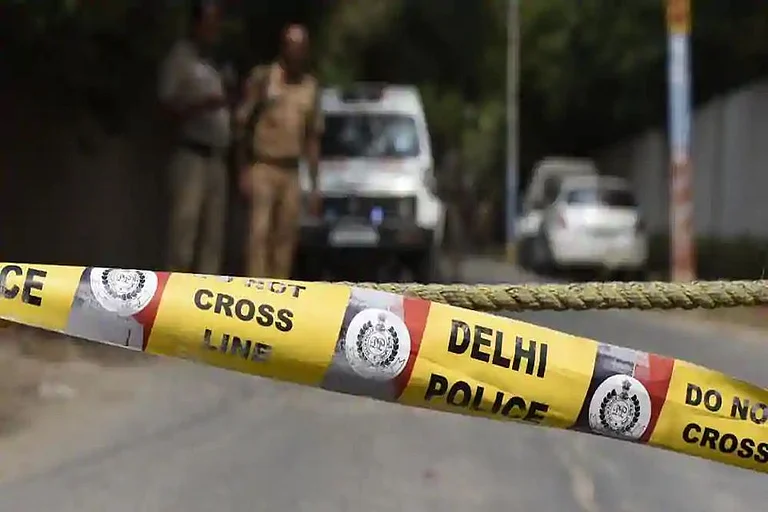For Mohammad Ashraf Poswal, 64, a resident of the Tangdhar border area, the present move by the government of including Paharis, a linguistic identity, in the Scheduled Tribe list, will be a death knell for Gujjar progress in Jammu and Kashmir. Last week, Poswal came from Shamspora village in Tangdhar, around 152 km north of Srinagar, to register his protest. According to Poswal, he is the only person who was a government employee in his village. “I was appointed in the education department in the 1980s and retired four years ago. There is no other employee from our village and now there will not be any,” says Poswal. He has four children, and he believes that if Paharis are included in the Scheduled Tribe, his children will have no chance as they cannot compete with Paharis. “My children have studied in government schools and colleges. While Pahari children study in elite schools in Jammu and Srinagar and receive the best education,” he says.
The Union government introduced the Constitution (Jammu and Kashmir) Scheduled Tribes Order (Amendment) Bill, 2023, in the Lok Sabha during the current session. According to the bill, the Paharis Ethnic Group, along with three other groups in Jammu and Kashmir viz -Paaddi Tribe, Gadda Barahmin, and Koli tribe, would be notified as Scheduled Tribes.
Gujjars' opposition to Pahari inclusion
Gujjars argue that Paharis are not a tribal group. They say the majority of them belong to the upper castes Muslim, Hindu, and Sikhs, and remained the ruling affluent class, and if they are granted ST status, Gujjars will suffer and be pushed towards perpetual poverty. In the protests launched by Gujjars, they demand the government to roll back the bill.
During one such protest, Fatima Farooq, Block Development Council chairperson from Doda district in Jammu, said Gujjars will not accept this oppression. “I want to convey to the government of India that the tribal community has always sacrificed for the tricolor, even during the peak of militancy. Today, you are accusing us of shouting anti-national slogans when we trying to safeguard our rights,” she said. She claimed that Gujjar leaders and activists who are protesting against the bill might be arrested. “But we are not afraid,” she said. She urged top Gujjar leaders to join the agitation started by Gujjar leaders in Jammu and Kashmir. A student leader stated that if Paharis are given Scheduled Tribe status, it will create further issues.
On July 31, a joint statement was issued by former ministers Mian Altaf Ahmad Larvi (National Conference), Chowdhary Zulfikar Ali, and Aijaz Ahmad Khan, along with the former deputy-chairman of J&K Legislative Assembly Choudhary Javed Ahmad Rana (NC), former legislator Choudhary Qamar Hussain (Apni Party), and former MLA Choudhary Mohammad Akram Lassanvi. They collectively sought the intervention of the central government to address the matter for which the protest is going on across J&K.
"The widespread protests by the Gujjar-Bakerwal tribe and the unrest in the community across the Union territory of J&K are grave developments. Protests by the Gujjar-Bakerwal tribe against the Union Government and UT administration are an aberration, and we are deeply concerned and utterly bewildered by the prevailing situation. We would appeal and urge the Union government and the UT administration to sincerely and proactively engage with and address the genuine concerns of the Gujjar-Bakerwal tribe about their legitimate rights and welfare. We also request the Union government to arrive at participative decisions on sensitive issues that have the potential to disturb intercommunity relations in J&K," the leaders said in a joint statement.
Zahid Parwaz Choudhary, a Gujjar activist argues that the Pahari community has different castes, and if the bill is passed, 300 more castes will be added to the list of tribals in J&K. “The castes of Kashmiri Muslims, Dogra Hindus, and Sikhs and Pahari speaking people and Pahari group are same. Even Pahari and Dogri Languages are of the same origin. The bill will make the entire J&K a tribal state at the cost of Gujjars, Bakerwals, Gaddis, Sippis, and Dard Tribes,” he adds.
In Jammu and Kashmir, the population of the pastoral Gujjars and Bakarwals is spread throughout various areas. However, their largest concentrations can be found in districts like Rajouri, Poonch, Anantnag, Reasi, Ganderbal, Bandipora, Udhampur, Jammu, Kulgam, Shopian, and other areas.
In 1989, the Jammu and Kashmir constitution officially designated twelve communities as scheduled tribes. Among these, eight communities – namely Balti, Beda, Bot, Brookpa, Changpa, Garra, Mon, and Purigpa – were granted scheduled tribe status in 1989. In line with the constitution, the other four communities, including Bakarwals, Gujjars, Gaddis, and Sippis, were added to the list of scheduled tribes in 1991.
Reports of commissions
According to the tribal researcher of J&K, Javaid Rahi, the inclusion of the Gujjar-Bakerwal community as Scheduled Tribes in 1991 marked a significant milestone and happened after a long struggle. He says this achievement followed reports of several commissions starting from the Kakasahib Kalekar Commission established in 1953. This commission identified 837 "most backward" castes in India, including "Gujjars," classifying them as cowherds and graziers and recognizing their disadvantaged status in multiple states, including J&K.
In 1967, the Gajendra Gadkar Commission was formed by the Jammu and Kashmir government to enumerate backward classes. Its 1968 report included Gujjar-Bakerwals in the list. The Justice JN Wazir Committee in 1969 and the Anand Committee in 1976 advocated for a 4% reservation for Gujjars-Bakarwals under the category of socially and economically backward classes. The Mandal Commission in 1979 acknowledged Bakerwals and Gujjars as socially and economically backward classes, deserving affirmative actions in Jammu and Kashmir.
Based on these recommendations, the Government of India declared 'Gujjars and Bakarwals' as Scheduled Tribes of India on April 19, 1991, and later in 1996, they were granted 10% reservation. “The decision by the central government was a historic move to empower the Gujjars/Bakerwals community in J&K,” he adds.
Now the row has started as the government has introduced a bill to include four communities in the list of Scheduled Tribes (STs) in J&K: 'Gadda Brahman', 'koli', 'Paddari Tribe', and 'Pahari Ethnic Group'. Gujjars are objecting to the inclusion of Paharis in the Constitution (Jammu and Kashmir) Scheduled Tribes Order (Amendment) Bill, 2023, which is one of the four Bills relating to the Union Territory introduced in the Lok Sabha. Gujjars argue that Paharis were never recognized as an ethnic group or Pahari caste by any census conducted in J&K. They say that they belong to upper-caste Muslims, and upper caste Hindus, and Sikhs, and a linguistic group rather than a tribal one. The present bill to add the Paharis as the ST is based on a report of Prof. Amin Peerzada Committee findings.
Pahari identity and justification for inclusion
In 2012-13, the J&K government commissioned a study by Prof. Amin Peerzada of Kashmir University, which supported the ST status of Paharis. In his report, Peerzada said, “The Pahari language has been recognized in the sixth schedule of the constitution of Jammu and Kashmir. It's an offshoot of the Indo-Aryan family of languages, comprising various dialects as recognized in the 'Linguistic Survey of India' by George Grierson. Religiously, Pahari is spoken by a diverse group, including Muslims, Hindus, and Sikhs. The community is concerned about the preservation of their culture, particularly their language, which they consider their status symbol and a hallmark of their identity.”
He also stated, “Economically, Pahari Speaking People are poor, and their economy is primarily based on subsistence agriculture and other allied activities such as cattle rearing, giving them their pastoral and migratory character. Given the lack of infrastructure and absence of commercial avenues, unemployment is rampant among the Pahari Speaking People of the state. The report further highlighted that the Pahari community has been striving for Scheduled Tribe Status since 1975. “Their struggle towards this cause sharpened in 1991 following the conferring of Scheduled tribe status upon Gujjar-Bakkarwals of the State. This created a definite consciousness among the Pahari community, who launched a full-fledged movement to get the said preferential treatment, due to identity concerns.”
Geographically, the Pahari-speaking community is distributed throughout the State. However, their major pockets are found among the foothills of the Pir-Panchal range, with major concentrations in Poonch, Rajouri, Baramulla, and Kupwara. Besides these four major pockets, their habitations are also found in Anantnag, Kulgam, Shopian, Pulwama, Budgam, Ganderbal, and Bandipora districts. Though the demand was rejected at that time, the Paharis finally got a 4% reservation in jobs and educational institutions in 2020.
Later in 2019, Justice (retd) G.D. Sharma commission was appointed to identify groups that were socially, educationally, and economically backward. The commission, in its report, recommended changing the nomenclature of Pahari Speaking People to the Pahari Ethnic group. Besides, the commission recommended adding Gadda Brahmins, Kolis, Paddari, and Pahari Ethnic Groups to the ST list of J&K.
In November last year, Gujjar leaders launched a Pad Yatra (Protest March) to protest against the inclusion of Pahari Speaking People in the ST list. They were subsequently called to New Delhi, where Dr. Javaid Rahi, who led a delegation of J&K Gujjars, met with the Home Minister on November 24, 2023. He says, “In the wake of the protest march by the Gujjars and Bakerwals youth against the Central Government's move on granting Scheduled Tribe status to the Pahari Speaking People, Union Home Minister Amit Shah invited representatives of the agitating Joint Action Committee. The tribal elders of the Gujjar community deputed me to lead them in a team, though I was not an agitator. During the meeting, the Home Minister assured us that there will be no dilution in the existing quota as well as other ST benefits to the Gujjar community. On our plea, the Home Minister stated that the existing 10 percent reservation for the community will remain intact, and the Pahari Speaking People as Scheduled Tribe would be accommodated in a separate block. I accordingly informed the Gujjar community, and the march was discontinued after the assurance made by the Home Minister."
"However, now, Gujjars have again started the agitation opposing ST Status for Pahari Speaking People,” he adds. Rahi says Gujjars believe this issue is beyond 10 percent reservation as it will make Gujjar identity vulnerable and open up institutions built over the years for Gujjars for non-tribals.
Journalist and author Zafar Choudhary says the political attention on Bill to include Pahari-speaking people in the list of Scheduled Tribes is like missing the woods for trees. “Overexcitement of Paharis and the anger among Gujjars has overshadowed the whole issue. In fact, as a strategy that is intrinsically linked to a widespread process of change stemming out of Constitutional changes of August 2019, the government is recasting social and political realities across Jammu and Kashmir -a wholesome and all-encompassing change in the status quo,” he adds.
Choudhary, who is the author of the highly acclaimed book, Kashmir Conflict and Muslims of Jammu, says the ST for Paharis is part of an overall restructuring of social identities which includes around a dozen and half communities by way of widening the ambit of reservation under ST, SC and bringing in several communities under the OBC. “This will have a bearing on existing J&K-specific reserved categories such as RBA, ALC, and OSC. Since all reservations have to be packaged within 50%, the alteration within the quota of RBA, ALC, and OSC is imminent. This means the concentration of traditional beneficiaries could shift from existing areas to newer areas and communities,” he adds.


























